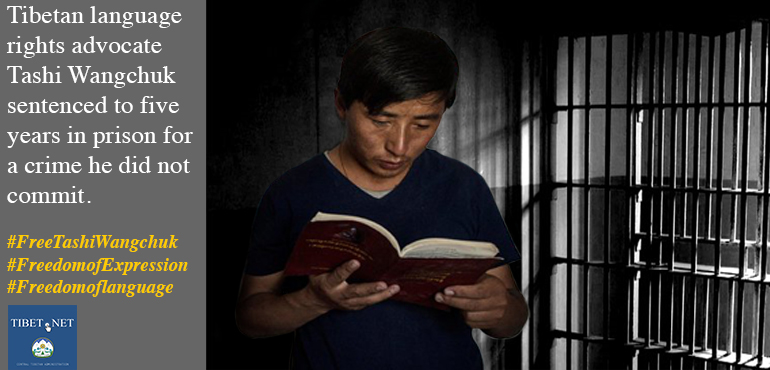Tibetet Segítő Társaság Sambhala Tibet Központ
Tibet Support Association Sambhala Tibet Center
székhely / telephely H-Budapest I. Attila út 123..
(00-36) 70 431 9343 (00-36)70 944 0260 (06-1)782 7721
sambhala@tibet.hu www.tibet.hu tibetpress.info
Facebook/Sambhala Tibet Központ Facebook/Tibett Segítő Társaság
MagnetBank/ 16200010-00110240
IBAN/HU94 16200010 00110240 00000000 SWIFT/HBWEHUHB
(1%) adószám/ 18061347-1-41
nyitva tartás/hétköznap 12.00-20.00 hétvégén előadás függő
» Retro» Tibeti művészet» Interjú» Levelek» Tibet Press» Tibet Press English» Dharma Press» Human Rights» Világ» Kína» Magyar» Ujgur» Belső-Mongólia » KőrösiCsoma» Élettér» Határozatok» Nyilatkozatok» tibeti művészet» lapszemle.hu» thetibetpost.com» eastinfo.hu» rangzen.net» ChoegyalTenzin» tibet.net» phayul.com» DalaiLama.com» vilaghelyzete.blogspot.com» Videók» Linkek» TibetiHírek» Szerkesztőség
Kína öt év börtönre ítélte a Tibeti nyelvet pártoló Tashi Wangchuk-ot
2018. május 22./CTA/TibetPress
Jelenleg csak angolul olvasható. Magyarul később.
eredeti cikk
Earlier today China pronounced its verdict on the Tibetan linguistic rights’ advocate Tashi Wangchuk’s case and sentenced him to five years for “inciting separatism”. Tashi Wangchuk, 32, was tried earlier this year on January 4 at Yushu Intermediate People’s Court but the court adjourned without a verdict at that time.
Both of Tashi Wangchuk’s lawyers, Lin Qilei and Liang Xiaojin, confirmed the sentence according to initial news reports. New York Times reporter in China, Chris Buckley also posted on Twitter that he spoke to the lawyers who validated the same, adding that “Tashi has already said that he would appeal any guilty verdict.”
Tashi Wangchuk, a Tibetan shopkeeper from Kyekundo county in Kham Yulshul (Chinese: Yushu Prefecture) was detained on 27 January, 2016 for publicly advocating Tibetan language education in schools in Tibetan populated areas. Two months before his detention, Tashi Wangchuk appeared in a New York Times documentary in which he can be seen advocating for the rights of Tibetans to learn and study in their mother tongue.
According to sources, during the January trial which lasted for about four hours, the court said that Tashi Wangchuk defamed the government of “murdering ethnic culture” and ““destroying the written and spoken language,” and “controlling the Tibetan people’s actual use of Tibetan ethnic culture” and “tight surveillance” and “arbitrary arrests” for any reason. The courts pronounced that such actions “are against the Article 103 Section 2 of the Criminal Law of the PRC [… and] that he committed incitement of separatism.”
International human rights organizations rejected Tashi Wangchuk prison sentence calling it “grotesquely unjust,” “bogus separatism charges,” and the January trial a “politically motivated trial”. Human Rights Watch’s China director, Sophie Richardson said, “Tashi Wangchuk’s only ‘crime’ was to peacefully call for the right of minority peoples to use their own language—an act protected by China’s constitution and international human rights law.” In their statement on the conviction, Amnesty International’s East Asia Research Director, Joshua Rosenzweig stated, “Today’s verdict against Tashi Wangchuk is a gross injustice. He is being cruelly punished for peacefully drawing attention to the systematic erosion of Tibetan culture.”
The United Nations experts denounced Tashi Wangchuk’s imprisonment. Several foreign diplomats and parliaments raised concerns over Tashi Wangchuk’s detention and probable conviction. Following the trial, the European Parliament adopted urgency resolutions calling on China to release Tashi Wangchuk, while the Latvian Parliament and French Senate called for a “fair and transparent judgment process” for the Tibetan language advocate. German parliamentarians had also called for his release.
– Report filed by UN, EU and HR Desk, DIIR –
